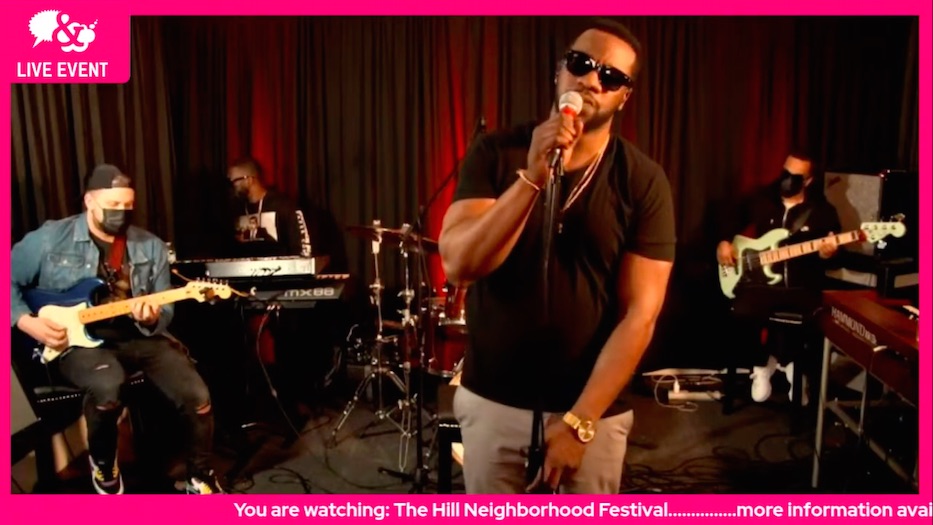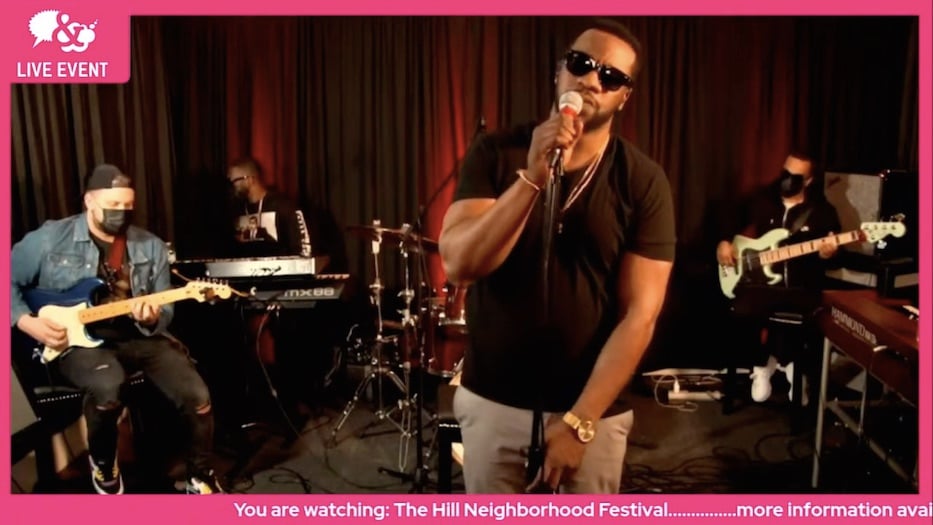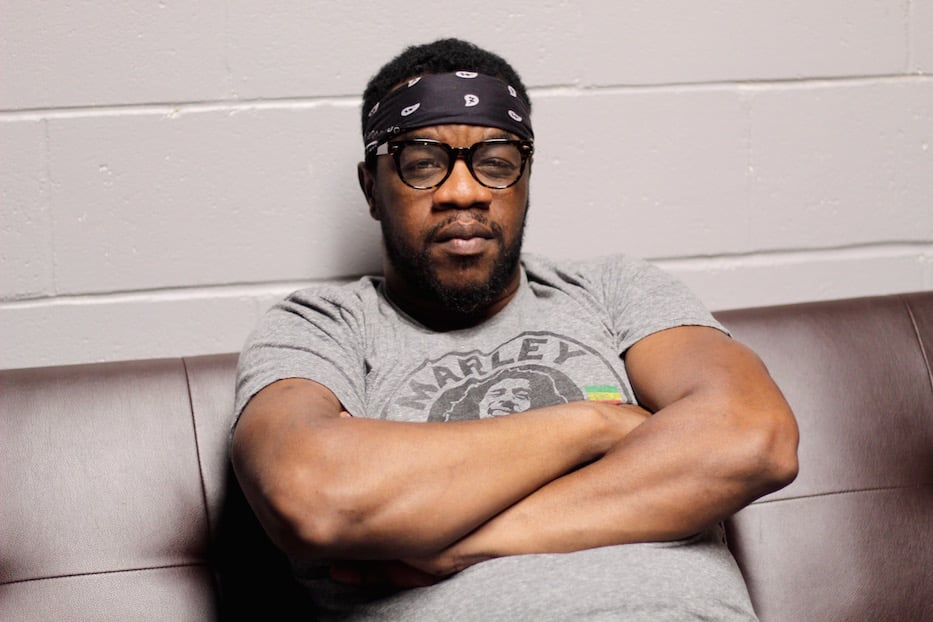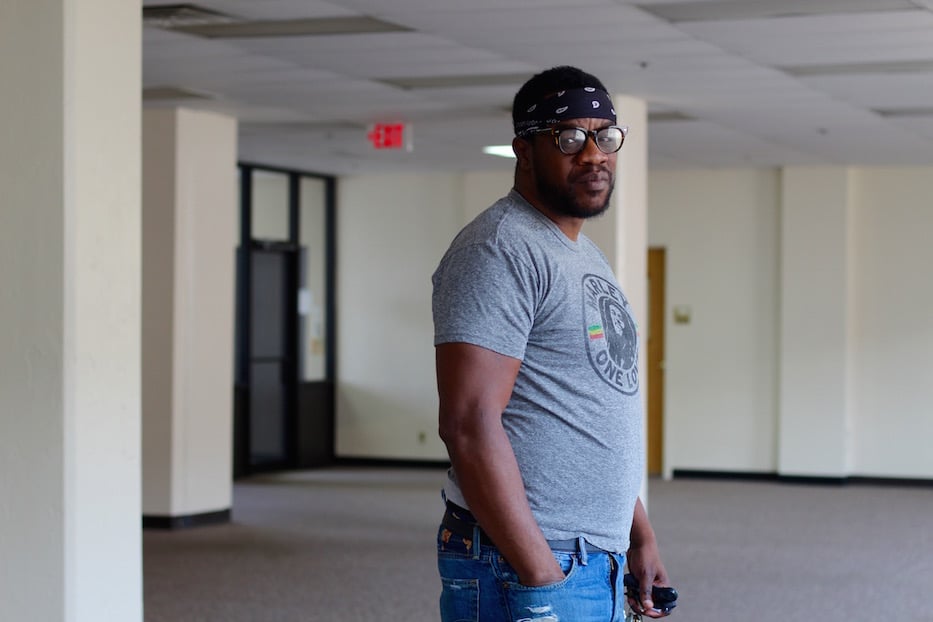
Music | Arts & Culture | Newhallville | The Hill
 James performing at the Hill Neighborhood Festival as part of the International Festival of Arts & Ideas.
James performing at the Hill Neighborhood Festival as part of the International Festival of Arts & Ideas.
When Manny James got vaccinated at Visels Pharmacy, he saw it as the culmination of a year dedicated to nurturing the community that raised him. Now, he's telling that story through new music, a new teaching business, and a cautious return to the world of live performance.
James—a.k.a. Manny James Sorrells—is the writer, musician, producer, and recording artist behind Church Street South Entertainment, a label that pays homage to the housing projects where he grew up. This year, the 43-year-old artist has grown his footprint as both a producer and a music educator with Creative Hearts, Inc., a program for young musicians to learn about performance and production. He operates it out of MADE Sound Studios, his space at 91 Shelton Ave.
It’s also seen him join tens of thousands of people across the city in getting vaccinated against Covid-19. For Sorrells, that meant going to the decades-old neighborhood pharmacy, rolling up his sleeve, getting a shot of Johnson & Johnson, and doing his part to protect the community he loves.
"It’s been a gift and a curse,” he said of the past year during a recent interview at his Shelton Avenue studio. “I feel like sometimes the universe and God tells you to sit down. We all needed to sit down. I just think that people had become too wrapped up in superficial things. It became less about community, and less about people, and less about family. It was a reset."

James in his studio. Lucy Gellman Photo.
The last year has been one of both deep grief and growth for the musician, who grew up in the Hill and now lives in Newhallville. In the early days of the pandemic, Sorrells was laid off from his job at Clifford Beers, where he was serving as a care coordinator. Just days later, he contracted Covid-19 that was so severe he said his skin hurt all the way to the eyelids. His head and muscles ached. He worried constantly about his wife and two small kids. For months afterwards, his breathing hitched when he tried to exercise.
It was compounded by what he called "the Donald Trump effect," in which the former president played down the magnitude of the pandemic. At home, Sorrells knew that a tiny virus had left him completely incapacitated for days. Around him, he saw people getting sick. Sorrells lost ten family members, seven to Covid-19. He played pre-pandemic interactions over and over in his head, wondering whether he had reminded people how much he loved them.
At one point, he attended three funerals in a single month. But when he turned on the television or looked at social media, he didn’t see a call for the American people to stay safe and shelter in place. He watched the former occupant of the White House suggest home remedies that included bright light and intravenous use of disinfectant.
"I've never dealt with so much death and loss in such a short period of time,” he said. “Like, I don't even think I've fully grieved because I've had so many funerals that go back to back. How do you grieve one when you go to another two and a half weeks later?"
In that gaping silence, he decided to pour himself into his work. He missed the crackling energy that came with audiences and full bands assembled on stage. He missed cheering on his friends, some of whom he has known and performed with for decades. As venues closed, the building that houses MADE Sound Studios stayed open. His home studio also never closed. Something clicked.
“I couldn't do what I wanted to do, so I picked up new things that I needed to do,” he said. “I needed to produce. I needed to take control of my artistry and my brand.”

"At the end of the day, I'm still that kid,” he said. “I'm still the little boy running through the projects, enjoying life, making friends, having different experiences. That's where everything started for me.”
He developed a new, stripped-down writing process. Listening to a single instrumental track—maybe a bass drum or piano—he’d sing over it. He’d edit, rewrite, and try out the song again until it felt right. Then he’d start building up the piece until the music filled the space. He estimated that he has 30 or 40 unfinished songs on his computer at any given time, to which he'll return when he starts writing. He keeps a running list of orphaned lines and verses in his phone.
In the past year, the process has given listeners two earwormy singles, “Never Let Me Go” and “1987.” He has also used the quiet of quarantine to work on a full-length concept album that he plans to release gradually this summer and into the fall. A new track,titled “Joysong” and inspired by and dedicated to his daughter, is set to drop next week.
"I'm in a very clear space musically—and just life in general," he said. "I'm hearing different things. It's like the rain is gone and I can see everything clearer. It's allowed me to expand on my artistry in every way. I'm more creative now than I've ever been. In many ways, I owe that to the pandemic. If it hadn't happened, I'd have still been running. I'd have still been on the hamster wheel if it didn't stop me."
In early November of last year, he also started teaching young people about music through Creative Hearts, Inc. Because Covid-19 rates were spiking, he started the program virtually, with a setup that relied on Zoom. He said it was hard: even the most motivated students can only learn so much over an internet connection. They returned to in-person teaching in February. Hand sanitizer and a thermometer now sit neatly beside his producing equipment. Students, of whom there are currently eight, come masked to his Shelton Avenue space.
He currently teaches production, writing and vocal performance, and has hired a recent graduate of the Hartt School to teach piano. He is currently working to secure nonprofit status, to find grant and individual funding sources that can subsidize lessons for parents.
It’s something he wishes he could have had growing up, he said—and something he was boxed out of simply because his parents couldn’t afford it. This summer, he said he plans to hold recitals in the space, among old pillars that used to be part of a Metals Research Laboratory.
"At the end of the day, I'm still that kid,” he said. “I'm still the little boy running through the projects, enjoying life, making friends, having different experiences. That's where everything started for me.”
It's part of a long-term dream to build out a larger space for artists of all ages. For years, Sorrells has thought about what it would mean to reopen and restore the long-shuttered Trowbridge Square Barbell Club, which most people knew as Hill Cooperative Youth Services or simply the Barbell. Sorrells went to classes at the Barbell when he was a kid. He returned as a camp counselor to work with young people when he was in his teens.
He said there's no doubt in his mind that the space, which closed several years ago, "saved my life." After a breakout performance in elementary school (read about that here), it was where he nurtured his love for the arts. In addition to music and production classes, he envisions spaces for multimedia classes in filmmaking, music, writing and visual art, after-school tutoring and activities. He wants to have counsellors on hand for kids struggling with mental health issues.
"I think these young people oftentimes find themselves in trouble, in difficult situations, because they don't have anything to do," he said. "Nobody's reaching out and mentoring them and giving them opportunities, and saying 'here, come with me.’ I was that kid, and now I'm an adult and I'm living my dream.”
That same goal—to give back to New Haven—also led Sorrells to get the Johnson & Johnson vaccine last month. He said he spent a long time thinking about it, because nothing in his life has taught him not to be trustworthy of the government. Sorrells grew up watching people penalize and stereotype his family because of who they were and where they lived. He's been stopped by the police for no reason, including while coming out of his place of work.
Then he thought about his wife and two young children, a baby girl and a little boy who just turned five. In early May, he headed to Visels Pharmacy on Dixwell Avenue. He posted a video of himself getting vaccinated to let other New Haveners know that vaccines were available in the neighborhood. He said he thinks of it as part of giving back.
"I wanted people to know it's right here," he said. "And, I know that all of y'all know I'm not taking it, I'm going to do it on video. If you are leaning, just do it. Protect the people that you love. It's bigger than me. And even in my own convictions, I'm always going to make the best decisions for the people around me."
He still isn’t sure how quickly he’ll return to live performance, he added. While he performed virtually for the International Festival of Arts & Ideas in late May, he’s worried about the likelihood of Covid-19 transmission at crowded, mask-optional venues, particularly those that are indoors. He’s eyeing the landscape of outdoor performances, but said that his mask won’t be going anywhere for a while.
He said he’s taking it step by step—or maybe track by track—and that’s okay with him. So far, that approach has him focused on his teaching and the future of his music. He keeps the Church Street South name next to his heart, in a soft space reserved for family.
"I'm carrying on the legacy of what that community really was,” he said. “Not what the perception of it was. What it really was for people that lived there. That was family. And I mean, some of the most intelligent, some of the greatest people I know came from those projects. And that's what the world needs to know. It made me who I am."
Learn more about Creative Hearts, Inc. at its website. Manny James' music and more about Church Street South Entertainment is available here.

